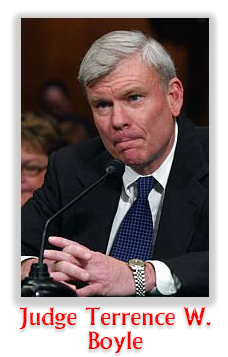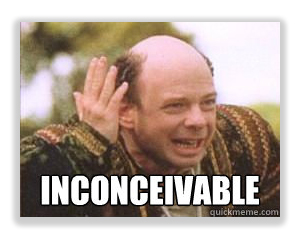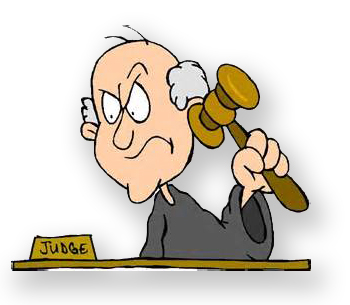We post news and comment on federal criminal justice issues, focused primarily on trial and post-conviction matters, legislative initiatives, and sentencing issues.
HEY, JUDGE – SHUT UP
We’ve had dealings with many federal judges in our day, and we have been impressed by most of them. If we were a criminal defendant, we would want to appear in front of a Mark Bennett (N.D. Iowa), a Jed Rakoff (S.D.N.Y.), a Jack Weinstein or (retired) John Gleeson (E.D.N.Y.), or a Jeff Helmick (N.D. Ohio). Not because these guys are soft on defendants, but because they’re thoughtful and fair.
 We won’t name any of the judges on the other end of the scale save one, who is the subject of today’s case. We have some experience with Hon. Terrence W. Boyle, U.S. District Judge for the Eastern District of North Carolina, and that experience left us all too able to believe the experience that would-be U.S. citizen Hemza Menade Lefsih, a native Algerian, had in Judge Boyle’s courtroom.
We won’t name any of the judges on the other end of the scale save one, who is the subject of today’s case. We have some experience with Hon. Terrence W. Boyle, U.S. District Judge for the Eastern District of North Carolina, and that experience left us all too able to believe the experience that would-be U.S. citizen Hemza Menade Lefsih, a native Algerian, had in Judge Boyle’s courtroom.
Judge Boyle has a distinction of being among the most reversed – if not the most reversed – district judge in the 4th Circuit. Twice he has been proposed for elevation to the 4th Circuit Court of Appeals – once by President George H.W. Bush and again a decade later by President George W, Bush – and twice the appointment has not been approved by the Senate. While his opponents included predictably liberal groups, Judge Boyle’s fitness has been roundly questioned “over concerns about competence not conservatism.” Notably, many of his reversals were for F.R.Crim.P. 52(b) “plain error,” mistakes so substantial and obvious that they merited reversal even when the defendant had not objected in the trial court.
Hemza could tell you all about that. Initially, he had immigrated to the United States some years ago through what’s known as the Diversity Immigrant Visa Program. The Diversity Program awards permanent residence immigration visas – “diversity visas” – to individuals from countries with historically low immigration numbers on the basis of a random lottery system. Hemza won a lottery slot and received a diversity visa. As allowed under the Diversity Program, he then applied for citizenship five years after coming here.
 Question 23 on the application form asks whether an applicant has “ever been arrested, cited, or detained by any law enforcement officer . . . for any reason.” Hemza, who had worked as a cab driver, answered “no” to Question 23, despite the fact he had gotten 11 traffic tickets during his driving career. He thought Question 23 referred only to serious criminal offenses that resulted in arrests or detentions and not to traffic tickets, and so believed that he was answering the question truthfully.
Question 23 on the application form asks whether an applicant has “ever been arrested, cited, or detained by any law enforcement officer . . . for any reason.” Hemza, who had worked as a cab driver, answered “no” to Question 23, despite the fact he had gotten 11 traffic tickets during his driving career. He thought Question 23 referred only to serious criminal offenses that resulted in arrests or detentions and not to traffic tickets, and so believed that he was answering the question truthfully.
Because Hemza failed to acknowledge his traffic tickets in answer to Question 23, the government – which should have had better things to do – charged him with making a false statement and immigration fraud. The government had no direct evidence that Hemza knew his answer to Question 23 was false. Instead, it relied on circumstantial evidence and its classic “smear the defendant” strategy.
An Immigration and Customs Enforcement agent testified that Hemza was proficient in English and had advanced education. In addition, the agent called Hemza’s motives in entering the Diversity Program into question, saying that in his experience, it was unusual that someone like Hemza would apply only for a diversity visa instead of a student visa, and probably did it because there were fewer restrictions on him as a diversity program entrant.
When the government’s next witness testified that the Diversity Program was established by Congress so that people from countries with historically low immigration rates would have an opportunity to live permanently in the United States, Judge Boyle could not restrain himself:
District court: You’re saying that Congress has set up a law that your agency enforces that invites people to come to America from places where they don’t normally come to America?
Special Agent Freitas: Yes.
District court: That’s incredible. And the reason that they don’t come to America is because they haven’t tried to come to America? Is that it?
Special Agent Freitas: Usually because of – they may not have family members here from those countries or employment opportunities.
District court: Okay. Do you think anybody in America knows about this, other than the Committee that sent it through Congress? Probably not.
Special Agent Freitas: I didn’t know it before I started –
District court: And it’s your job. Don’t you love Congress? I mean, unbelievable, unbelievable. I’m sitting here 32 years, first time I ever heard this. And you’re talking about the hundred countries that nobody could name if they had a list of 180 countries in the world?
Special Agent Freitas: Yes.
District court: The bottom hundred.
 Judge Boyle carried on like this for an extended period, at one point complaining that “so if you get lucky and win the diversity lottery and get a card to come to America you can drag along your ten kids and four wives or what?” He whined that where some programs admitted people Aren’t there quotas on people coming from countries that send a lot of people here, and you who had proven they were “a doctor, an engineer or a rocket scientist or someone who is going to contribute to the well-being of the United States of America and make it a better place to live because of your skill or personal characteristics,” the Diversity Program used by Hemza told people “in the bottom hundred countries in the world, just come on.”
Judge Boyle carried on like this for an extended period, at one point complaining that “so if you get lucky and win the diversity lottery and get a card to come to America you can drag along your ten kids and four wives or what?” He whined that where some programs admitted people Aren’t there quotas on people coming from countries that send a lot of people here, and you who had proven they were “a doctor, an engineer or a rocket scientist or someone who is going to contribute to the well-being of the United States of America and make it a better place to live because of your skill or personal characteristics,” the Diversity Program used by Hemza told people “in the bottom hundred countries in the world, just come on.”
Hemza was his own witness, explaining his incorrect answer to Question 23 was an honest mistake, rather than a knowing falsity, that “he did not understand what the word ‘cited’ meant, or that “traffic tickets are actually included in the word cited.” Instead, because the word “cited” appears between “arrested” and “detained” in Question 23, Hemza assumed that it carried a similar meaning: being taken into custody. He testified, “It never occurred to [me] that [a] traffic ticket could be [a] criminal offense.”
Hemza was convicted. Ironically, at sentencing, Judge Boyle said he believed Hemza was “sincere” in his account of his “unknowing mistake,” thus putting meat on the bones of the old saying that “it takes a good prosecutor to convict the guilty, but it takes a great prosecutor to convict the innocent.”
 This time, the 4th Circuit ruled earlier this week, the “great” prosecutor had help. The appellate court reversed Hemza’s conviction, holding that Judge Boyle’s diatribe about the Diversity Program denied him a fair trial.
This time, the 4th Circuit ruled earlier this week, the “great” prosecutor had help. The appellate court reversed Hemza’s conviction, holding that Judge Boyle’s diatribe about the Diversity Program denied him a fair trial.
A federal judge need not sit silently during the presentation of evidence at trial. “There is no question,” the Court of Appeals said, “that in these core matters of trial management, a district court is granted broad discretion.”
But there are limits, and Judge Boyle – unsurprisingly to us – exceeded them. “This jury,” the 4th Circuit said, “would have no need to deduce from a pattern of interruptions or questions that the district court was skeptical of the defendant; here, the district court conveyed that skepticism directly. In the context of an immigration-fraud case – that is, with immigration front and center before the jury – the court began with a series of questions and comments suggesting a negative view of the very immigration program through which Lefsih had entered the country: ‘[U]nbelievable, unbelievable.’ And contrary to the government’s argument, what reasonably could have appeared to the jury as the court’s disapproval did not stop with the Diversity Program itself, or the Congress that established it. Instead, the court went on to provide a negative assessment of the people – like Lefsih himself – who make use of the Diversity Program to come to the United States.”
 This was a case in which the credibility of the defendant was of “crucial importance,” and as a result, aspersions cast by the court on the trustworthiness of Diversity Program entrants would have carried special weight. The Circuit Court concluded that “it is enough to say” that Judge Boyle’s comments “taken together, would have conveyed to the jury the court’s ‘negative impression’ of the Diversity Program and the immigrants who avail themselves of the Program, and thus of Lefsih himself.”
This was a case in which the credibility of the defendant was of “crucial importance,” and as a result, aspersions cast by the court on the trustworthiness of Diversity Program entrants would have carried special weight. The Circuit Court concluded that “it is enough to say” that Judge Boyle’s comments “taken together, would have conveyed to the jury the court’s ‘negative impression’ of the Diversity Program and the immigrants who avail themselves of the Program, and thus of Lefsih himself.”
The 4th Circuit includes the obligatory “we do not doubt that the district court in this case acted without any intent to influence the jury improperly” language, but veteran Judge Boyle watchers recognize that statement for the mandatory fig leaf that it is.
Hemza will get a new trial.
United States v. Hemza, Case No. 16-4345 (4th Cir., Aug. 14, 2017)
– Thomas L. Root

